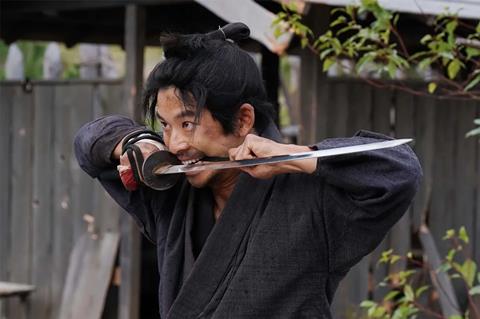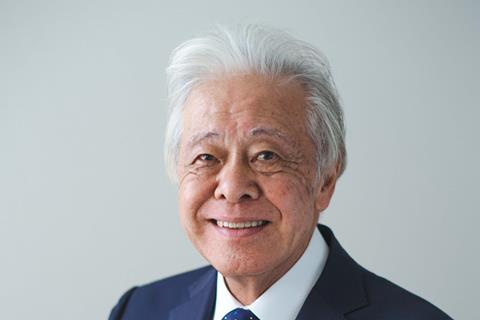
The ambition of Tokyo International Film Festival (TIFF) to transform and grow has been clear to see in recent years and shows no sign of slowing for its 37th edition. Japan’s biggest film festival has already relocated from its former home in Roppongi to Tokyo’s high-end cultural district of Hibiya-Ginza, had its programme reorganised and streamlined, and established a series of talks with high-profile filmmakers in collaboration with Palme d’Or winner Hirokazu Kore-eda.
With these firmly in place, TIFF is now expanding its focus on international exchange between Japan, Asia and the rest of the world while working to nurture the next generation of filmmakers and supporting female perspectives with a new section.
“We are aiming to develop the festival into one that has the appropriate status and recognition it deserves,” says TIFF chairman Hiroyasu Ando, who has been reshaping the festival since his appointment in 2019. “As the festival is located in Asia, we seek to grow it as a hub that not only promotes the Japanese film industry, but the entire Asian film industry as a whole.”
This year’s edition (October 28 to November 6) will include 120 films and three series across the 10 main sections. The selection was made from 2,023 entries, up from 1,942 last year.
The Asian push can be seen in this year’s 15-strong competition strand, the majority of which hail from the region, including three films apiece from Japan and China alongside titles from Hong Kong, Taiwan and Kazakhstan. The selection includes She Taught Me Serendipity from Japan’s Akiko Ohku, Chinese feature The Unseen Sister by Midi Z, and Papa by Hong Kong’s Philip Yung. “Notably, this year features many films from China and we anticipate an increase in the number of Chinese filmmakers visiting TIFF,” says Ando.
The opening film is also homegrown — Kazuya Shiraishi’s period action film 11 Rebels, based on a previously unproduced script by Kazuo Kasahara, who died in 2002, will kick off this year’s edition.

The TIFF Lounge talk sessions will also return with on-stage filmmaker conversations. Taking part are Kore-eda, Indian director Payal Kapadia, whose All We Imagine As Light won the grand prix at Cannes, Singapore’s Eric Khoo (Spirit World), Indonesia’s Mike Wiluan (Orang Ikan), Hong Kong’s Johnnie To and Japan’s Irie Yu. The latter is also this year’s director in focus.
Ando’s international ambitions are prominent throughout the programme, with a focus on Italy marking a recently enacted Japan-Italy film co-production agreement. This will include screenings of three titles by Nanni Moretti, the selection of Christophe Honoré’s Marcello Mio as the festival’s closing feature and the inclusion of actress Chiara Mastroianni in the competition jury.
This year’s lifetime achievement award will be presented to Hungary’s Bela Tarr, marking the first time a non-Asian filmmaker has received the honour since Manoel de Oliveira in 1997, and the cast of Ridley Scott’s Gladiator II will attend the Asian premiere at TIFF, with Paul Mescal, Denzel Washington and Connie Nielsen expected to appear.
“We have focused on ensuring the selection of films includes both high-quality works suitable for the festival and films that will appeal to a broad audience,” says Ando. This has been down to TIFF programming director Shozo Ichiyama, a veteran producer who has worked with Takeshi Kitano, Taiwan’s Hou Hsiao-hsien and acclaimed Chinese filmmaker Jia Zhangke.
Female empowerment
Introduced this year is the Women’s Empowerment section, which is co-hosted by the Tokyo metropolitan government and includes seven films by female directors, including Japan-France co-production Adabana by Sayaka Kai and German feature Ivo by Eva Trobisch, which won the Heiner Carow Prize at this year’s Berlinale.
The section is programmed by Andrijana Cvetkovikj, who is the festival’s first non-Japanese programmer and the new executive producer of TIFFCOM, the affiliated content market that runs October 30 to November 1.

“TIFF was the first Asian film festival to join the Collectif 50/50 movement in 2021,” says Ando of an initiative that aims for equality, parity and inclusion in the film industry. “Promoting women’s empowerment is an important mission for the entire world, and TIFF aims to provide maximum co-operation and support toward this effort.”
The festival takes this commitment further with the new section and will also show Women Make Films — The Tokyo International Women’s Film Festival, a documentary looking back on the eponymous festival, which ran from 1985 to 2012.
In addition, a Women in Motion talk, co-hosted with luxury-goods company Kering, will see Japanese actors Rinko Kikuchi and Hayato Isomura, and Netflix producer Makiko Okano share their perspectives on the challenges for women in the industry. Kore-eda will deliver an opening speech.
“Nurturing future talent is another crucial mission of the festival,” adds Ando. “We have worked to expand both the quantity and quality of various initiatives aimed at cultivating the next generation of filmmakers.”
This mission will see the festival continue its TIFF Teens programme, in which middle-school students learn filmmaking skills, and will stage a masterclass for Asian exchange students hosted by Kiyoshi Kurosawa, the prolific director of Serpent’s Path and Venice premiere Cloud, who received the Asian filmmaker of the year award at the recent Busan International Film Festival. In addition, a symposium will be held to explore how film education can contribute to society.
Despite the forward momentum, Ando is still facing challenges in realising his ambitious vision. “Due to the impact of the yen’s depreciation and rising prices, our expenses have increased, making it challenging to secure funding,” reveals the chairman. “Securing the necessary budget posed a significant challenge.”
However, TIFF appears to have achieved its goals for this year and the budget was shored up by a crowdfunding initiative, which it has operated since 2017 and this year saw the audience provide a record figure of $114,000 (¥17.1m).
What Ando cannot seem to crack is a planned date shift, from late October after Venice, Toronto and Busan to earlier in the year. “There are voices that suggest our timing should change to enhance the festival’s operational effectiveness, but this involves various factors that need consideration,” he says. “It’s a subject for ongoing discussion.”

























No comments yet